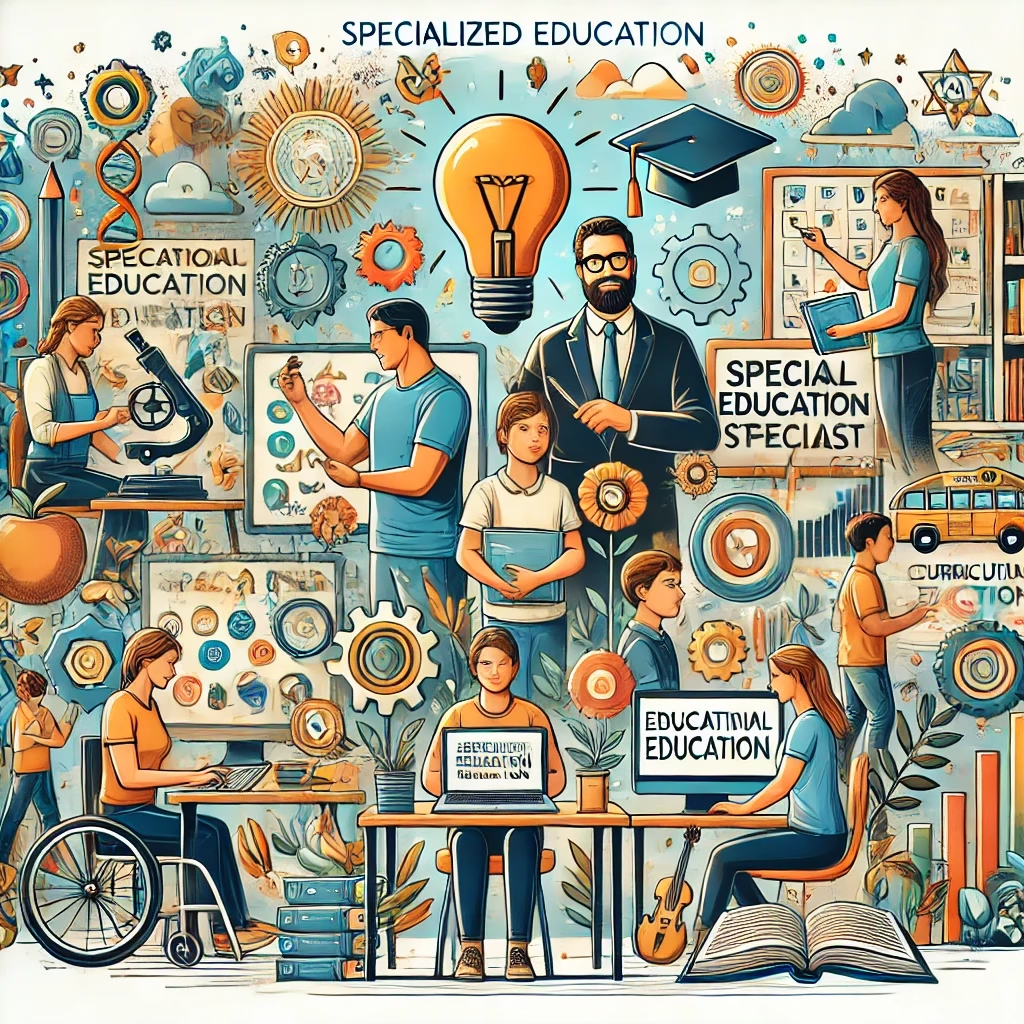A surprising fact shows that a Bachelor of Education degree opens doors to many careers. Over 7 unexpected careers are available to graduates. For example, Academic Advisors earn a median of $60,140 a year, with a 5% growth rate. This makes careers in education diverse and fulfilling.
Jobs like teaching and educational administration are in high demand. They offer great opportunities for those who love education.
Table of Contents
- Key Takeaways
- Understanding the Value of Your Bachelor of Education Degree
- Traditional Teaching Positions in Public and Private Schools
- Specialized Education Roles and Opportunities
- Educational Leadership and Administrative Positions
- Careers for Bachelor of Education Graduates in Corporate Settings
- Educational Technology Integration Specialist
- Curriculum Development and Instructional Design
- Academic Support and Student Services
- Educational Consulting and Private Tutoring
- International Education Opportunities
- Non-Profit and Educational Program Management
- Conclusion: Maximizing Your BEd Degree for Career Success
- FAQ
- What are the top 10 careers for Bachelor of Education (BEd) graduates?
- What are the core skills developed during a Bachelor of Education program?
- What traditional teaching positions can BEd graduates pursue?
- What specialized education roles can BEd graduates pursue?
- What educational leadership and administrative positions can BEd graduates pursue?
- What corporate career opportunities are available for BEd graduates?
- What educational technology integration roles can BEd graduates pursue?
- What curriculum development and instructional design roles can BEd graduates pursue?
- What academic support and student services roles can BEd graduates pursue?
- What educational consulting and private tutoring opportunities are available for BEd graduates?
Key Takeaways
- Careers for bachelor of education graduates include traditional teaching positions and specialized education roles.
- Education-related jobs, such as instructional coordination and educational administration, offer competitive salaries and growth opportunities.
- Teaching opportunities are available in public and private schools, as well as in corporate settings.
- Bachelor of Education graduates can pursue careers in educational technology, curriculum development, and academic support.
- Corporate training and education consulting are also viable career options for BEd graduates.
- With a Bachelor of Education degree, graduates can pursue a range of careers that utilize their skills and knowledge in education.
- Education-related jobs offer a sense of fulfillment and purpose, making them a rewarding career choice.
Understanding the Value of Your Bachelor of Education Degree
A Bachelor of Education degree is a valuable asset for those who want to work in education. It teaches important skills like lesson planning, classroom management, and using educational technology. With this degree, graduates show they are serious about teaching, opening up many professional development paths and chances for advancement.
Recent statistics show that Bachelor’s degree holders have 57% more job opportunities than those without a degree. This gap is expected to grow, with 70% of jobs needing more than high school education by 2027. A Bachelor of Education degree can lead to careers in educational leadership roles and school counseling positions. It also brings benefits like higher salaries, lower unemployment, and more chances for personal and intellectual growth.
- Increased job opportunities and higher salaries
- Lower unemployment rates and poverty levels
- Opportunities for personal and intellectual growth
- Development of core skills such as lesson planning and classroom management
Core Skills Developed During BEd Program
The Bachelor of Education program teaches key skills like using educational technology, managing classrooms, and planning lessons. These skills are vital for a successful teaching career. They can also be used in various professional development paths, including educational leadership roles and school counseling positions.
Traditional Teaching Positions in Public and Private Schools

Many Bachelor of Education graduates find jobs in public and private schools. They can teach subjects like math, science, and English. They can also work as education administrator, school counselor, or department heads.
In the 2020-2021 school year, there were 3.7 million public school teachers and 466,000 private school teachers. Public schools had a 15.4-to-1 student-to-teacher ratio. Private schools had a 12.2-to-1 ratio. This shows a big need for teachers in both types of schools.
Some important jobs in teaching include:
- Classroom teacher
- Education administrator
- School counselor
- Department head
These jobs need good communication and leadership skills. Teachers must also create interesting lesson plans. With the right skills, Bachelor of Education graduates can do well in these roles.
There are also education administrator roles and school counselor jobs in schools. These jobs involve managing educational programs and supporting students. With an education degree, graduates can take on these roles and help their students.
| School Type | Number of Teachers | Student-to-Teacher Ratio |
|---|---|---|
| Public Schools | 3.7 million | 15.4-to-1 |
| Private Schools | 466,000 | 12.2-to-1 |
Specialized Education Roles and Opportunities

Bachelor of Education graduates have many career paths. They can work in special education, early childhood, or adult education. These roles need special skills and the ability to meet different learning needs.
Jobs like special education teachers and early childhood educators are available. Adult education instructors teach various subjects to adults. These roles are both rewarding and challenging, often requiring more education.
Special education teachers earn a median of $59,780 a year. Instructional coordinators make about $63,740. Education consultants and coaches can earn up to $68,877 and $63,740, respectively. Here’s a table showing some of these roles and their salaries:
| Role | Average Annual Salary |
|---|---|
| Special Education Teacher | $59,780 |
| Instructional Coordinator | $63,740 |
| Education Consultant | $68,877 |
| Instructional Coach | $63,740 |
These roles are perfect for Bachelor of Education graduates. They can make a real difference in students’ and adults’ lives. With the right education, they can have a fulfilling career in education.
Educational Leadership and Administrative Positions

Recent data shows that educational leadership roles are open to Bachelor of Education graduates. They can move into leadership spots like school administration positions. These include roles like school principal, department head, or curriculum director.
To succeed in these roles, one needs strong leadership and management skills. They must also be able to create and carry out educational policies and programs.
Here are some department head jobs and their median salaries:
- Elementary, middle, and high school principals: $98,420
- Dean of Students in a college or university setting: $96,910
- Chief Academic Officer: $145,437
These jobs need strong communication skills and the ability to make decisions based on data. They also require a dedication to bettering student outcomes. By taking on educational leadership roles and school administration positions, Bachelor of Education graduates can truly make a difference in education and grow their careers.
Careers for Bachelor of Education Graduates in Corporate Settings

Bachelor of Education graduates can find great jobs in corporate settings. They can work in corporate training, learning and development, and educational content creation. These roles let them use their education skills to help companies grow.
Some important jobs include corporate training jobs. These roles involve making and teaching training programs to employees. Learning and development positions mean managing educational programs and materials. Educational content development is about making educational stuff like online courses and workshops for companies.
Key Career Paths
- Corporate Training Specialist: designs and delivers training programs for employees
- Learning and Development Manager: oversees the development of educational programs and materials
- Educational Content Developer: creates educational content, such as online courses, tutorials, and workshops, for corporate clients
Training and Development Specialists make about $61,210 a year on average. This shows that Bachelor of Education graduates can get good-paying jobs in corporate training and learning and development.
By working in corporate settings, Bachelor of Education graduates can use their skills in educational content development and more. This helps companies succeed and helps graduates grow personally.
Educational Technology Integration Specialist
Being an educational technology specialist means you get to mix education and tech to make learning fun. You need to know a lot about technology and how to use it in schools. This job is growing fast, with a 2% increase in jobs from 2022 to 2032.
This role includes designing and implementing technology plans and helping teachers and students. You also need to check if the tech is working well. You must be good with technology and also have great communication skills.
Jobs for these specialists are found in schools, businesses, and non-profits. You might work as an instructional design job or a technology integration position. On average, you can earn about $68,086 a year, with salaries ranging from $26,500 to $106,000.
Working as an educational technology specialist has many perks. You can work in different fields, earn well, and grow professionally. Plus, you get to help improve education and learning.
- Opportunities to work in a variety of industries, including education, business, and non-profit organizations
- Competitive salary and benefits
- Opportunities for professional growth and development
- The ability to make a positive impact on education and learning
Curriculum Development and Instructional Design
Jobs in curriculum development and instructional design are growing fast, with a 7 percent increase expected by 2031. These roles involve making educational materials and designing programs. They are key in both schools and private training settings.
To succeed, you need skills like leadership, communication, and teamwork. Curriculum developers work with experts and teachers. They review books, conduct assessments, and analyze test results. On average, they earn about $70,200 a year, with more experience leading to higher pay.
Curriculum designers figure out the best way to teach goals. They research materials, talk to experts, and create programs. They also help teachers and design courses, making sure they fit with digital tools.
If you’re interested in this field, a bachelor’s degree is usually needed. But, many employers look for a master’s degree or extra certifications. The most important skills for these jobs include communication, writing, and teaching.
| Job Title | Median Salary | Growth Rate |
|---|---|---|
| Curriculum Developer | $70,200 | 7% |
| Instructional Designer | $78,000 | 20% |
Academic Support and Student Services

Jobs in academic support and student services are key in education. They help students reach their goals. Bachelor of Education graduates can find careers here, making a big difference in students’ lives. Academic support roles include tutoring, mentoring, and advising. Student services jobs cover programs like orientation and graduation.
Some important areas include:
- Academic advising and counseling
- Student life and engagement
- Career development and planning
- Student success and retention
Educational counseling helps students plan their future. It’s vital for their success and happiness. The U.S. Bureau of Labor Statistics says there will be more jobs in higher education.
Places like Northwestern University help students with career advice. Online sites like Udacity and Google offer free courses. By working in these fields, Bachelor of Education graduates can really help students and grow the education sector.
| Role | Description |
|---|---|
| Academic Advisor | Provides academic guidance and support to students |
| Student Life Coordinator | Manages student programs and events |
| Career Counselor | Helps students develop career plans and goals |
Educational Consulting and Private Tutoring
Educational consulting jobs and private tutoring positions are in high demand. They offer many opportunities for Bachelor of Education graduates. Skills needed include educational research, communication, and curriculum development.
Being an independent educational consultant or private tutoring business owner can be rewarding. Median annual wages range from $44,000 to $89,000. Test preparation specialist roles also exist, helping students prepare for tests. The field of instructional coordinators, including educational consultants, is expected to grow by 10 percent from 2020 to 2030.
Key Areas of Specialization
Educational consultants can specialize in areas like audio/visual education and curriculum design. To be competitive, becoming a certified educational planner (CEP) is an option. This requires a master’s degree and passing an exam. The average salary of an educational consultant is $64,542 per year, with a range between $40,000 to $103,000 annually.
- 62% of students earn a Master of Science in Teaching—Curriculum & Instruction degree within 12 months.
- Tuition costs for an online master’s degree program in Curriculum and Instruction are $4,125 per 6-month term.
- Projected job growth for educational consultants is estimated at 6% from 2019 to 2029, higher than the average growth rate across all occupations.
International Education Opportunities
International education jobs offer many chances for Bachelor of Education graduates to teach or work abroad. The need for skilled teachers is growing, making teaching abroad a favorite choice. Working in international schools is special because it lets you be part of a diverse and multicultural setting.
Working abroad comes with many benefits. You get to see different cultures, gain global experience, and broaden your view. Teaching English abroad is a big hit, as it lets you teach English in places like China, Japan, or South Korea. International school jobs, though, mean teaching students from all over, covering subjects from elementary to high school.
About 70% of international education master’s students aim for program management careers. This shows the increasing need for experts in this field. To find international education jobs, graduates can look into:
- Teaching English abroad
- Working in international schools
- Pursuing careers in program management
In summary, international education jobs offer a unique and fulfilling path for Bachelor of Education graduates. With the right skills and qualifications, they can explore various roles, from teaching abroad to working in international schools.
Non-Profit and Educational Program Management
With a Bachelor of Education degree, you can work in non-profit and educational program management. You’ll manage programs, create curricula, and lead staff. Non-profit jobs are in organizations that help students who need it most. There are about 1.8 million nonprofits in the U.S., mostly in California, Texas, and New York.
Educational program management positions cover roles like after-school programs or summer camps. Program director roles mean overseeing these programs. You’ll handle budgets, staff, and check how well programs work. The U.S. Bureau of Labor Statistics says instructional coordinators make sure curriculum meets all rules.
Key tasks in non-profit and educational program management include:
- Creating and running educational programs
- Managing budgets and staff
- Checking if programs work well
- Working with community groups and others
Non-profits get most of their money from people who donate. They use all extra money to help more.
| Job Title | Job Description | Median Salary |
|---|---|---|
| Program Director | Oversee educational programs and staff | $60,000 – $80,000 |
| Educational Consultant | Evaluate, develop, and implement curriculum | $50,000 – $70,000 |
| Instructional Coordinator | Develop and implement educational programs | $40,000 – $60,000 |
In conclusion, non-profit and educational program management offer many career paths for Bachelor of Education graduates. From program director roles to educational program management positions and non-profit jobs, you can help students and communities. With the right skills and experience, you can make a big difference.
Conclusion: Maximizing Your BEd Degree for Career Success
Starting your journey with a Bachelor of Education (BEd) degree opens up a world of career success and many educational career paths. This degree gives you the skills and experience to excel in various educational settings. You can work in traditional teaching, corporate training, or even in educational technology.
To reach your full career height, it’s key to keep learning and growing. Look for professional development chances to stay updated with the latest trends. Your dedication to learning will make you a valuable asset in your career.
As you move through the educational world, be ready to try new things and face new challenges. The skills you gained in your BEd program will help you adapt and solve problems. This will help you succeed in a changing field and reach your career goals.
FAQ
What are the top 10 careers for Bachelor of Education (BEd) graduates?
BEd graduates have many career paths. They can teach in schools or work in education roles. They can also lead in education, train in companies, or work in tech.
They can develop curricula, support students, or consult privately. They can even work abroad or manage non-profit programs.
What are the core skills developed during a Bachelor of Education program?
A BEd degree teaches key skills like planning lessons and managing classrooms. It also covers using technology in education. This degree is valued by employers and can lead to certifications.
What traditional teaching positions can BEd graduates pursue?
BEd holders can teach various subjects and ages, from young kids to high school students. They can also become school administrators, counselors, or department heads.
What specialized education roles can BEd graduates pursue?
BEd graduates can work in special education, early childhood, or adult education. These roles need specific skills and the ability to meet different learning needs.
What educational leadership and administrative positions can BEd graduates pursue?
BEd graduates can lead as school principals, department heads, or curriculum directors. They need strong leadership and management skills. They also need to create and enforce educational policies.
What corporate career opportunities are available for BEd graduates?
BEd graduates can work in corporate settings. They can create and deliver training programs. They can also manage learning initiatives and develop educational content.
What educational technology integration roles can BEd graduates pursue?
BEd graduates can be tech integration specialists. They help schools use technology in education. They need technical skills and can design and implement tech plans.
What curriculum development and instructional design roles can BEd graduates pursue?
BEd graduates can work in curriculum and instructional design. They create educational materials and design programs. They also develop assessments for learning.
What academic support and student services roles can BEd graduates pursue?
BEd graduates can help students in academic support and services. They provide guidance and help students reach their goals. They work in academic support, services, and counseling.
What educational consulting and private tutoring opportunities are available for BEd graduates?
BEd graduates can offer educational services privately. They can be independent consultants, run tutoring businesses, or prepare students for tests.




